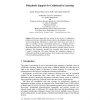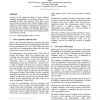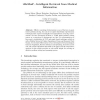INTERACT
2003
15 years 3 months ago
2003
: Reactive Information Displays (RIDs) that track and react to a user’s attention, to present the right information at the right place and in the right time, constitute a relativ...
108
click to vote
GAMEON
2001
15 years 3 months ago
2001
The field of multi-agent systems is an active area of research. One of the possible applications of a multi-agent system is the use of distributed techniques for problem solving. ...
100
click to vote
IJIT
2004
15 years 3 months ago
2004
Expert systems development is a complex and expensive process that needs to be applied in an organized manner. This paper presents an approach for building a generic treatment mode...
121
click to vote
IADIS
2004
15 years 3 months ago
2004
We have developed models of how strategies are constructed and retained as male and female high school and university students gain experience in solving online qualitative chemic...
CRIWG
2006
15 years 3 months ago
2006
This paper argues that one reason for the success of collaborative problem solving where individual attempts failed is the polyphonic character of work in small groups. Polyphony, ...
AAAI
2006
15 years 3 months ago
2006
While it is commonly agreed that analogy is useful in human problem solving, exactly how analogy can and should be used remains an intriguing problem. VanLehn (1998) for instance ...
ACE
2004
15 years 3 months ago
2004
Contrary to the apparent beliefs of many students, computer programming and problem solving are not amenable to purely book learning. These skills can be acquired only by practice...
107
click to vote
HCI
2007
15 years 3 months ago
2007
With the U.S. facing a decline in science, math and engineering skills, there is a need for educators in these fields to team with engineers and cognitive scientists to pioneer nov...
BCSHCI
2007
15 years 3 months ago
2007
The Creative Problem-Solving Research Group (CPSRG) at Lancaster University is a collaboration between psychologists and computer scientists conducting research into creativity, p...
100
click to vote
EWCBR
2008
Springer
15 years 3 months ago
2008
Springer
Abstract. Effective encoding of information is one of the keys to qualitative problem solving. Our aim is to explore Knowledge representation techniques that capture meaningful wor...




